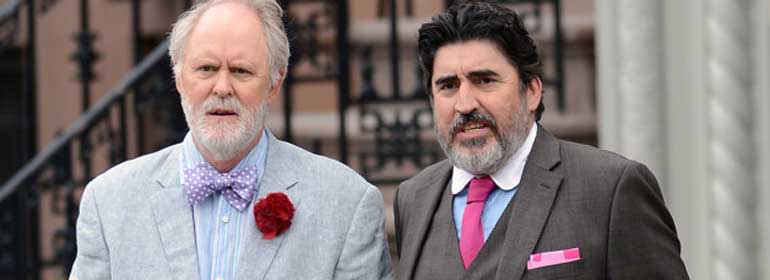It’s rare that a movie comes along that deals with the emotional complexities of being gay in a straight world as delicately, yet devastatingly as Ira Sachs’ ‘Love Is Strange’, says Brian Finnegan.
Movies in the genre that’s identified as ‘gay’ tend to feature coming of age stories, or romances set against hostile backgrounds, and while in its own quiet way, Ira Sachs’ Love is Strange encompasses both these tropes, it’s mostly a film about the insidiousness of prejudice, how it effectively operates and subtly reverberates, not only with its victims, but society as a whole.
Together for almost 40 years, and living in a beautifully appointed apartment in uptown New York, artist Ben (John Lithgow) and music teacher George (Alfred Molina) are finally tying the knot. We meet them as they wake up on the morning of their nuptials, and set about the ordinary routines of showering and dressing. After the ceremony, the two have a reception in their apartment, at which Ben’s niece-in-law, Kate (Marisa Tomei) gives an awkward, self-regarding speech that turns out to be about how Ben and George’s love inspired her own marriage to her husband.
Cut to George’s workplace, the Catholic school where he teaches. The Bishop is unhappy about the statement George’s marriage makes, so the powers that be summarily fire him. This spells disaster for the couple, given that Ben exists on a small pension and George is past his sell-by date in the careers market. Forced to sell their apartment, they go their separate ways until they can find another place to rent – Ben to stay with Kate, her husband and their son, Joey; George to his downstairs neighbours, younger gay couple Ted and Roberto.
The film then becomes about how each of the men copes with the upheaval, mostly focusing on Ben, who has been relocated to the bottom bunk in his resentful grand-nephew’s bedroom. For Kate, a stay-at-home writer, Ben’s presence in their small flat becomes increasingly annoying, and while at first he is impervious to this, soon he begins trying to exist in corners, without intruding.
Meanwhile George can find no space for himself at all in Ted and Roberto’s place, which is party-central for the couple’s colourful gang of friends.
“Sometimes, when you live with people, you get to know them more than you care to,” a tense Kate tells her husband, and for a while you think this is what the film is about, but then an altercation between Ben and Joey, after Ben decides to paint a portrait of Joey’s 16 year-old buddy, Vlad, brings this film into different territory altogether.
The discrimination meted out by the Catholic Church at the beginning is the thematic opening salvo, yet it’s the accepting Kate and her family who carry the central message forward, each of them undermining Ben as a gay man now that he’s effectively alone and without George’s protection. They don’t do it on purpose, their misinformed attitudes and fears are so deep, they’re not even recognised for what they are. It’s the homophobia in the ether, and Ben quietly watches as it all becomes centred upon him.
Central to the success of this film is John Lithgow’s beautifully understated performance. You can feel his deep vulnerability, but also sense a resilience that’s grown in him over the years. At 71, Ben can remember a time long before gay liberation and well-meaning speeches at same-sex weddings.
Alfred Molina and Marisa Tomei also turn in mature, well thought-out turns, the latter a simmering kettle of contradictions in a politically correct world. But it’s the young Charlie Tahan as Joey who brings this film home, and is central to its gentle, yet utterly heartbreaking resolution.
I expect on an emotional level gay audiences will have a different reaction to this rare film than straight audiences, who have never known the undermining complexities of the homophobia in the ether. But both sets will learn something about ingrained prejudice, and how we must battle against the prejudices we all hold within for a better future.
Brian Finnegan will introduce the opening screening of Love is Strange tonight at 6.30pm in The IFI. On Sunday at 1pm, GCN in association with GAZE and The IFI present a special screening of the film with all proceeds in aid of the Marriage Equality. Get tickets here.
© 2015 GCN (Gay Community News). All rights reserved.
